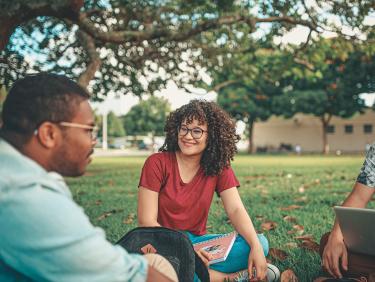Collegio Futuro
Collegio futuro is a joint interdisciplinary PhD college of the 4EU+ European University Alliance. Participants have the chance to tackle environmental issues in an interdisciplinary manner and receive mentoring and support from a European network of peers.
Reaching the sustainable development goals of the United Nations and coping with major planetary problems, such as climate change and biodiversity loss, requires a socio-economic transformation that ensures sustainable development. In this transformation, multiple societal stakeholders have to be involved. Conceptualizing this process demands an integration of perspectives from different research disciplines and needs creative and open-minded experts, who do not hesitate to step out of their comfort zone and collaborate in an interdisciplinary manner, striving for the best solutions. As a joint interdisciplinary PhD college of the 4EU+ member universities, the Collegio futuro seeks to foster these skills, which are essential for tackling our urgent environmental, economic and societal challenges.
Collegio futuro is aimed at doctoral students from all research disciplines who seek to expand their knowledge beyond their own research area, with the goal of
- strengthening competencies in interdisciplinary communication and project elaboration,
- empowering students to transfer their knowledge and expertise to different contexts,
- promoting critical and system thinking,
- raising awareness for the challenges of socio-economic transformation,
- encouraging communication of scientific findings to civil society.

CALL FOR APPLICATIONS
The program is open to doctoral students at all levels, doing research in different disciplines of natural and life sciences, social and economic sciences, or humanities at one of the participating 4EU+ Universities (Charles/Prague, Heidelberg, Sorbonne, Milan and Warsaw). Experience in environmental research is not a requirement.
Applicants from Heidelberg University should send a short expression of interest to the program coordinator by January 23, 2025 at the latest.
Contact: collegio-futuro@uni-heidelberg.de
The application process for other partner universities has been closed.
Curriculum
During the course, participants work in multidisciplinary groups to address practical environmental issues, with an emphasis on the development of a policy brief. They have the chance to exchange ideas with peers and examine the chosen problems from different perspectives. Engaging in discussions with scientists and practitioners, they work to identify and propose feasible solutions to given problems. Altogether, the participants engage in activities that enable them to expand their network, generate impulses for new projects and enhance their skills in science communication.
Activities:
- WORKSHOP 1 (half-day), online: Introductory lectures
- WORKSHOP 2 (2h, in groups), online: Getting together and forming groups
- Individual work: Preparing for Spring school
- One-week SPRING SCHOOL, on-site in Heidelberg: Developing a concept for policy brief
- Individual & group work (self-organized), online: Finalization of the policy brief
- Final meeting (2 h), online: Discussion of the outcome with supervisors
Participation in Collegio futuro is voluntary. Participants should contact their graduate school to inquire about the recognition of ECTS. A letter of attendance will be issued for regular participation and drafting a policy brief in a group.
SPIN-OFF PROJECTS
Climate Action Science
European member states possess significant potential to reduce emissions and mitigate the climate change, making their actions—or lack thereof—a powerful signal to the rest of the world. However, national climate policies within the EU often do not match the ambitious goals of the European Commission. The Collegio futuro group Climate Action Science continued to cooperate beyond the course to explore the questions: How are climate impacts evolving over time in different European countries? What shifts are occurring in public attitudes and climate policies? And how are these elements interconnected? The results have been published in the journal „Sustainability“ in 2023.
Post-mining sites: the green gold rush
Born from interdisciplinary collaboration on ecosystem restoration, the project examines the potential of marginal land, such as former coal mining sites across Europe, to be transformed into areas of environmental sustainability and economic opportunity. The project has been selected for funding within the 4EU+Call „Charles Minigrants for students 2024“ awarded by Charles University.




